BusinessEurope Headlines No. 2017-22
Private sector drives an enhanced EU-Africa partnership
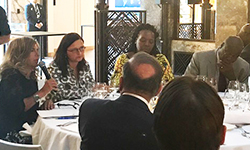 On the occasion of the EU-Africa Business Forum that took place in Brussels on 7 June 2017, Emma Marcegaglia, President of BusinessEurope, gave a strong message on the role of the private sector in promoting a solid and effective EU-Africa partnership. She stated that EU and African countries face a number of common challenges, including security threats, structural unemployment, especially of young people, and climate change. Therefore, a real partnership – at political, business and institutional level – between the two continents will help turn the challenges into opportunities. Marcegaglia emphasised the role of business. For instance, European companies are present in Africa, investing in agriculture, infrastructure, energy and services. They contribute to the diversification of the economies in Africa, the upgrading of skills and the increase of the competitiveness of African companies, helping them export and participate in Global Value Chains. “This is an important year, as we prepare for the EU-Africa Business Summit, which will take place in November, and we anticipate the launch of the negotiations for a renewed EU-Africa relationship beyond 2020”, she commented. In this context, BusinessEurope will contribute actively to the discussions.
On the occasion of the EU-Africa Business Forum that took place in Brussels on 7 June 2017, Emma Marcegaglia, President of BusinessEurope, gave a strong message on the role of the private sector in promoting a solid and effective EU-Africa partnership. She stated that EU and African countries face a number of common challenges, including security threats, structural unemployment, especially of young people, and climate change. Therefore, a real partnership – at political, business and institutional level – between the two continents will help turn the challenges into opportunities. Marcegaglia emphasised the role of business. For instance, European companies are present in Africa, investing in agriculture, infrastructure, energy and services. They contribute to the diversification of the economies in Africa, the upgrading of skills and the increase of the competitiveness of African companies, helping them export and participate in Global Value Chains. “This is an important year, as we prepare for the EU-Africa Business Summit, which will take place in November, and we anticipate the launch of the negotiations for a renewed EU-Africa relationship beyond 2020”, she commented. In this context, BusinessEurope will contribute actively to the discussions.
Contact: Sofia Bournou
Investments are the key to unlock the untapped potential of development policies
 Markus J. Beyrer, Director General of BusinessEurope, joined the high-level closing panel of the European Development Days, which took place on 7-8 June in Brussels. The event gathers every year key development policy actors – heads of state, international institutions, business and NGOs - to debate global challenges. Daniel Duncan, Vice-President of Ivory Coast and Tedros Abhanom Ghebreyesus, Director General-elect of the World Health Organisation also participated in the panel. In his intervention, Beyrer highlighted the importance of investments for development. “European companies are active on the ground, cooperating closely with local authorities, communities and NGOs; they are leaders in sustainable development and corporate social responsibility”, he stated, adding that at the same time, these companies face a number of de facto risks that may prevent them from certain investment decisions. It is therefore crucial to develop the right framework that will allow the realisation of investments even under the most challenging circumstances. BusinessEurope supports the development of an EU External Investment Plan and calls on the European Commission to cooperate closely with the private sector. Our experience will contribute to the design of a modern, comprehensive and inclusive instrument, at the core of the EU’s development policy.
Markus J. Beyrer, Director General of BusinessEurope, joined the high-level closing panel of the European Development Days, which took place on 7-8 June in Brussels. The event gathers every year key development policy actors – heads of state, international institutions, business and NGOs - to debate global challenges. Daniel Duncan, Vice-President of Ivory Coast and Tedros Abhanom Ghebreyesus, Director General-elect of the World Health Organisation also participated in the panel. In his intervention, Beyrer highlighted the importance of investments for development. “European companies are active on the ground, cooperating closely with local authorities, communities and NGOs; they are leaders in sustainable development and corporate social responsibility”, he stated, adding that at the same time, these companies face a number of de facto risks that may prevent them from certain investment decisions. It is therefore crucial to develop the right framework that will allow the realisation of investments even under the most challenging circumstances. BusinessEurope supports the development of an EU External Investment Plan and calls on the European Commission to cooperate closely with the private sector. Our experience will contribute to the design of a modern, comprehensive and inclusive instrument, at the core of the EU’s development policy.
Contact: Sofia Bournou
New Economic Outlook highlights strengthening EU growth
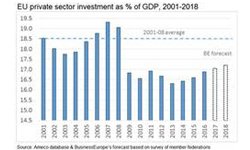 European business federations expect a continuation of the EU’s economic recovery, with growth becoming more broad-based both across countries and sectors. BusinessEurope’s Spring 2017 Economic Outlook, published on 9 June, expects growth of 1.9% in the EU, around 0.3 percentage points higher than forecast last autumn. Investment is expected to see some improvement (2.7% for both 2017 and 2018), in particular as companies increasingly reach the limits of their current production capacity. However, at the current rate of investment growth, it would take up to 2024 to close the existing investment gap compared to pre-crisis levels. In light of this data we’ve written a letter to the current chair of the Economic and Financial Affairs Council of the EU (ECOFIN), Malta’s Minister of Finance, Edward Scicluna. In this letter, we emphasised the need for forthcoming ECOFIN Council decisions to support EU investment.
European business federations expect a continuation of the EU’s economic recovery, with growth becoming more broad-based both across countries and sectors. BusinessEurope’s Spring 2017 Economic Outlook, published on 9 June, expects growth of 1.9% in the EU, around 0.3 percentage points higher than forecast last autumn. Investment is expected to see some improvement (2.7% for both 2017 and 2018), in particular as companies increasingly reach the limits of their current production capacity. However, at the current rate of investment growth, it would take up to 2024 to close the existing investment gap compared to pre-crisis levels. In light of this data we’ve written a letter to the current chair of the Economic and Financial Affairs Council of the EU (ECOFIN), Malta’s Minister of Finance, Edward Scicluna. In this letter, we emphasised the need for forthcoming ECOFIN Council decisions to support EU investment.
![]() Contact: Frederik Lange
Contact: Frederik Lange
Pro-democracy campaign launched
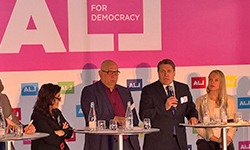 On 7 June Markus J. Beyrer, BusinessEurope Director General, participated in the launch event of the ALL – Alliance for Democracy – a network of different actors of European society that are taking part in a diverse and inclusive pro-democracy campaign in the run-up to the European Parliament elections in 2019. BusinessEurope is involved. “The European Union is built on the values of democracy and freedom. BusinessEurope has supported the European Union since the very beginning. There is no freedom of enterprise without free thinking and true democracy. Engaging in the debate on the future of Europe and working in partnership with ALL reflects this conviction”, stressed Beyrer.
On 7 June Markus J. Beyrer, BusinessEurope Director General, participated in the launch event of the ALL – Alliance for Democracy – a network of different actors of European society that are taking part in a diverse and inclusive pro-democracy campaign in the run-up to the European Parliament elections in 2019. BusinessEurope is involved. “The European Union is built on the values of democracy and freedom. BusinessEurope has supported the European Union since the very beginning. There is no freedom of enterprise without free thinking and true democracy. Engaging in the debate on the future of Europe and working in partnership with ALL reflects this conviction”, stressed Beyrer.
For more information about the initiative please visit https://allfordemocracy.eu/.
Contact: Jasmin Plone
BusinessEurope and Keidanren hold the 6th sector-to-sector meeting
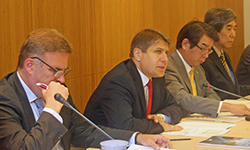 Opening the event Markus J. Beyrer said: “This shows our joint commitment to regulatory dialogue and regulatory cooperation that is so important in the EU-Japan trade and investment relations. Japan and the EU have a lot to share and to learn from each other. This meeting enables an open exchange and understanding of each other’s positions. Hopefully this will have a positive impact on the current negotiations of a free-trade agreement between the EU and Japan”. The automotive, chemicals, digital and railway sectors participated in the meeting. Antti Peltomäki, Deputy Director-General of DG Grow, and Kazuo Kodama, Ambassador of the Mission of Japan to the European Union, represented respectively the European Commission and the Japanese Government. The Japanese delegation was headed by Akira Shimizu, Chairman of Planning & Coordinating Sub-Committee, Committee on Europe of Japan Business Federation Keidanren. At the end of the meeting, BusinessEurope and Keidanren issued a joint release. Photos
Opening the event Markus J. Beyrer said: “This shows our joint commitment to regulatory dialogue and regulatory cooperation that is so important in the EU-Japan trade and investment relations. Japan and the EU have a lot to share and to learn from each other. This meeting enables an open exchange and understanding of each other’s positions. Hopefully this will have a positive impact on the current negotiations of a free-trade agreement between the EU and Japan”. The automotive, chemicals, digital and railway sectors participated in the meeting. Antti Peltomäki, Deputy Director-General of DG Grow, and Kazuo Kodama, Ambassador of the Mission of Japan to the European Union, represented respectively the European Commission and the Japanese Government. The Japanese delegation was headed by Akira Shimizu, Chairman of Planning & Coordinating Sub-Committee, Committee on Europe of Japan Business Federation Keidanren. At the end of the meeting, BusinessEurope and Keidanren issued a joint release. Photos
![]() Contact: Maurice Fermont
Contact: Maurice Fermont
New study points out industry’s challenges and strategies
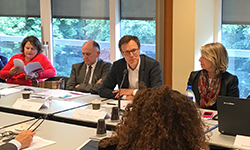 “The EU needs to enhance its industrial competitiveness. We need to reflect on the state of play on Europe’s industrial base and on the barriers to it”, said Alexandre Affre, BusinessEurope Director for Industrial Affairs, speaking at the event “The performances of European firms: a benchmark analysis”. Co-organised by the Italian federations Assolombarda and Confindustria, the event took place in Brussels last 7 June. In presence of the Vice-President of the European Parliament's Committee on Industry, Research and Energy (ITRE) Patrizia Toia (MEP) and representatives from the European Commission and from the business community, Alexandre added: “The survey from Assolombarda identifies important features that qualify a firm as top performer and it is a key tool for identifying the constraints, challenges and strategies that since 2009 have been determining the performance of the manufacturing sector in five of the most industrialised European regions – Lombardy, Baden-Württemberg, Bayern, Cataluña and Rhône-Alpes”. The study will be published after summer. Read the previous edition.
“The EU needs to enhance its industrial competitiveness. We need to reflect on the state of play on Europe’s industrial base and on the barriers to it”, said Alexandre Affre, BusinessEurope Director for Industrial Affairs, speaking at the event “The performances of European firms: a benchmark analysis”. Co-organised by the Italian federations Assolombarda and Confindustria, the event took place in Brussels last 7 June. In presence of the Vice-President of the European Parliament's Committee on Industry, Research and Energy (ITRE) Patrizia Toia (MEP) and representatives from the European Commission and from the business community, Alexandre added: “The survey from Assolombarda identifies important features that qualify a firm as top performer and it is a key tool for identifying the constraints, challenges and strategies that since 2009 have been determining the performance of the manufacturing sector in five of the most industrialised European regions – Lombardy, Baden-Württemberg, Bayern, Cataluña and Rhône-Alpes”. The study will be published after summer. Read the previous edition.
![]() Contact: Alexandre Affre
Contact: Alexandre Affre
Building an investment policy for a more cohesive Europe
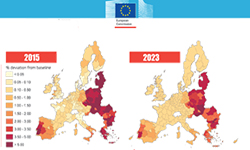 BusinessEurope published a position paper putting forward a number of ideas on how to improve and strengthen EU cohesion policy, making it fit to address today’s challenges and to prove a real enabler for European regions to compete by scaling-up and exploring their capabilities. The EU cohesion policy supports hundreds of thousands of projects in all European regions. It is the EU’s largest source of investment, encouraging important real economy projects and contributing to structural change in EU Member States. However, its benefits must be magnified.
BusinessEurope published a position paper putting forward a number of ideas on how to improve and strengthen EU cohesion policy, making it fit to address today’s challenges and to prove a real enabler for European regions to compete by scaling-up and exploring their capabilities. The EU cohesion policy supports hundreds of thousands of projects in all European regions. It is the EU’s largest source of investment, encouraging important real economy projects and contributing to structural change in EU Member States. However, its benefits must be magnified.
![]() Contact: Joana Valente
Contact: Joana Valente
Free flow of data is essential for the Single Market
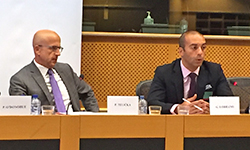 Guido Lobrano, BusinessEurope Deputy Director, participated in a debate on the “Free Flow of Data as the 5th freedom of the EU” at the breakfast meeting of the Alliance of Liberals and Democrats for Europe (ALDE) on 8 June at European Parliament. The event was hosted by Pavel Telička, European Parliament Vice-President. Lobrano highlighted that the free flow of data is essential to make the EU Single Market work, as data localisation measures undermine our four freedoms and are fundamentally weakening the European economy as a whole, well beyond digital industries. As a consequence, they do not only harm the digital economy, but affect all businesses, across sectors and particularly small and medium-sized enterprises (SMEs). BusinessEurope supports the commitment by the European Commission in the recent Digital Single Market review to ensure the free flow of data within the Single Market. The EU should ensure existing laws requiring data localisation are removed and new localisation requirements are notified and can only be kept if properly justified and proportionate.
Guido Lobrano, BusinessEurope Deputy Director, participated in a debate on the “Free Flow of Data as the 5th freedom of the EU” at the breakfast meeting of the Alliance of Liberals and Democrats for Europe (ALDE) on 8 June at European Parliament. The event was hosted by Pavel Telička, European Parliament Vice-President. Lobrano highlighted that the free flow of data is essential to make the EU Single Market work, as data localisation measures undermine our four freedoms and are fundamentally weakening the European economy as a whole, well beyond digital industries. As a consequence, they do not only harm the digital economy, but affect all businesses, across sectors and particularly small and medium-sized enterprises (SMEs). BusinessEurope supports the commitment by the European Commission in the recent Digital Single Market review to ensure the free flow of data within the Single Market. The EU should ensure existing laws requiring data localisation are removed and new localisation requirements are notified and can only be kept if properly justified and proportionate.
![]() Contact: Guido Lobrano
Contact: Guido Lobrano
Calendar
 15-16 June 2017: Digital Assembly 2017 "Digital Europe: investing in the future", Valletta
15-16 June 2017: Digital Assembly 2017 "Digital Europe: investing in the future", Valletta- 18 June 2017: French legislative election
- 20 June 2017: EU Sustainable Energy Week 2017
- 20 June 2017: International forum on women and trade, Brussels
- 22-23 June 2017: European Council